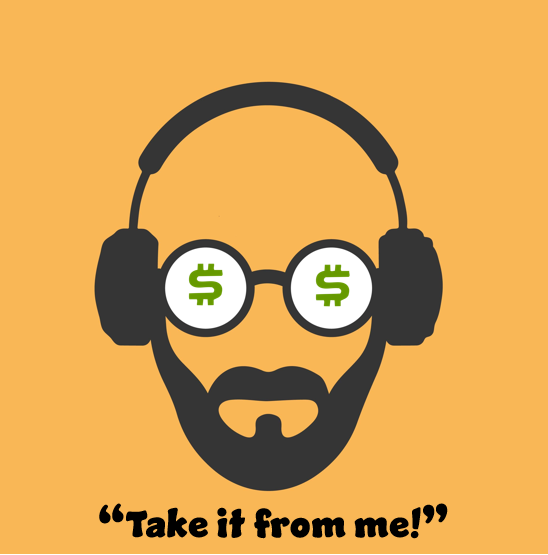
The live read.
You’ve seen the research. They work. And they’re far more palatable than most of the produced garbage out there. When a trusted personality talks about a product, service, diet, or treatment they use, it carries a lot of weight. Hence, advertisers pay a higher rate…sometimes a very high markup for these more conversational one-to-one ads.
 But as you may have read, the Federal Trade Commission just put its bureaucratic foot down HARD on a radio endorsement campaign that ran back in 2019-20 for Google Pixel 4 phones on iHeart radio stations. All told, iHeart personalities sang the praises of how these smartphones could take great photos day and night nearly 29,000 times.
But as you may have read, the Federal Trade Commission just put its bureaucratic foot down HARD on a radio endorsement campaign that ran back in 2019-20 for Google Pixel 4 phones on iHeart radio stations. All told, iHeart personalities sang the praises of how these smartphones could take great photos day and night nearly 29,000 times.
The lawsuit involved the FTC and seven states where the spots aired. And last week, the two companies settled these disputes for a hefty $9.4 million, with Google bearing the brunt of the fines. Like most live read/endorsement efforts, the campaign was very lucrative. Radio Ink reported Google paid north of $2.6 million for the ads, along with another $2 million for spots that aired “by smaller radio networks.”
Here’s an example of one of the live reads in question:
Where did the campaign go wrong? According to FTC’s Bureau of Consumer Protection Director Samuel Levine, “Google and iHeartMedia paid influencers to promote products they never used.”
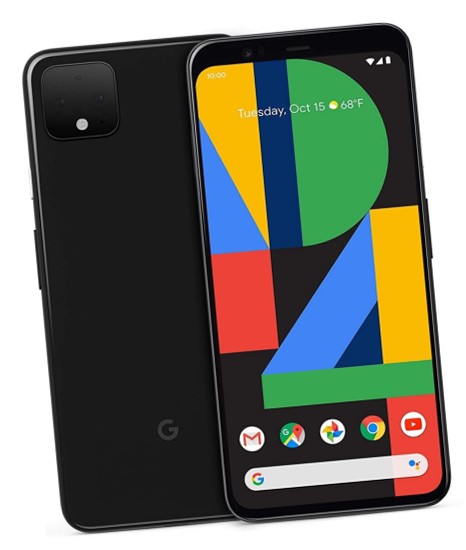
And Massachusetts Attorney General Maura Healey added, “It is common sense that people put more stock in first-hand experiences. Consumers expect radio advertisements to be truthful and transparent about products, not misleading with fake endorsements. (The) settlement holds Google and iHeart accountable for this deceptive ad campaign and ensures compliance with state and federal law moving forward.”
If you’re running a radio cluster or you own a radio company you might be thinking, “There but for the grace of Marconi goes us.” Or words to that effect. That’s because myriad companies are engaged in the same practices.
In every likelihood, so are many podcasters.
One of the hallmarks of the efficacy of podcast ads is the fact the best of the bunch are read by credible hosts. As they slide directly from their podcast into a live read that sure sounds like an implicit endorsement of a product or service.
Are those hosts speaking from experience? Have they actually used the sponsor’s mattress, hair coloring, travel site, or job recruiting service? Were they given the opportunity to take a test drive or experience the advertised goods?
Below is a data slide from this year’s Public Radio Techsurvey featuring an audience far more likely to listen to podcasts than commercial radio partisans.
We asked our PRTS respondents who listen to podcasts weekly or more often (and who notice ads) to comment on the effectiveness of host-read commercials. And the results should not surprise you. Commercials voiced by the podcasters themselves are preferred to produced commercials. Progressively younger podcast consumers are especially likely to lean toward host-read ads.
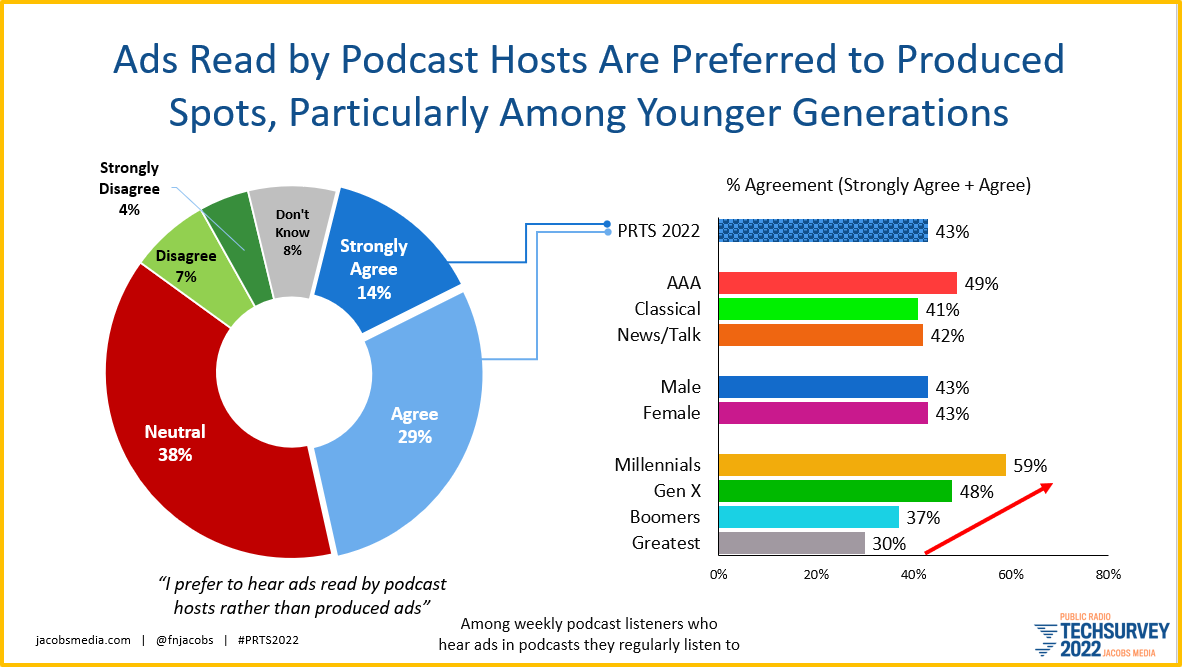
But that shouldn’t give podcast producers or radio managers license to just line up host endorsements. As Levine concluded, “The FTC will not stop working with our partners in the states to crack down on deceptive ads and ensure firms that break the rules pay a price.”
I’m not going to go all Oxenford on you, but it might not be a bad idea to review your station or your company’s advertising policies and practices, especially as they relate to live and recorded endorsements of sponsor goods and services.
Last week in her “Merge” column in AllAccess, social media whiz Lori Lewis strongly urged radio broadcasters to wise up on endorsements. Of course, she’s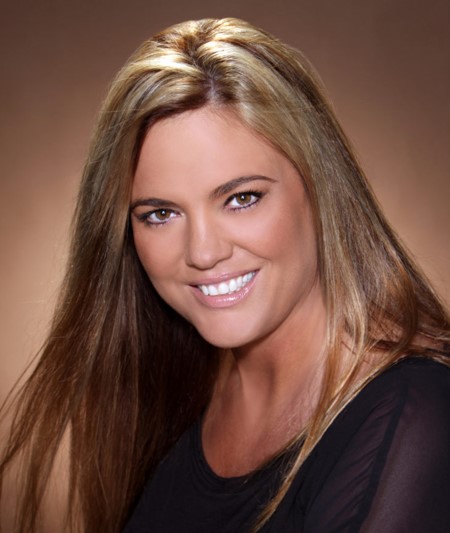 concerned about the credibility and authenticity of radio personalities.
concerned about the credibility and authenticity of radio personalities.
But Lori is also well aware of the liabilities stations face by being non-compliant with FTC requirements.
She offered up this handy list of dos and don’ts for endorsements. You’d also be wise to check in with your company’s legal advisors before signing up a sponsor and committing your air talent.
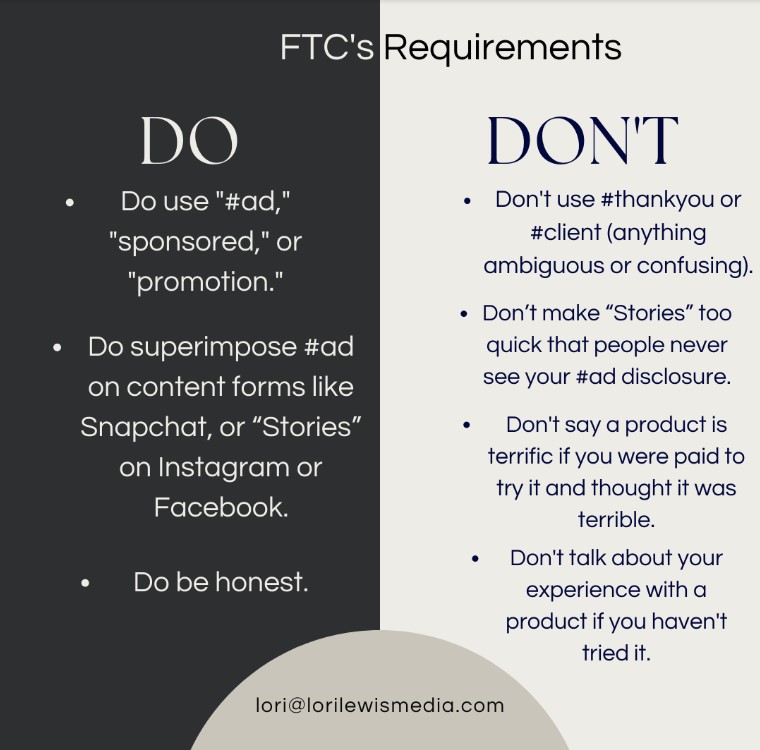 So, there’s the legal liability. But the other issue facing so many stations is simply letting endorsements and live reads get out of control.
So, there’s the legal liability. But the other issue facing so many stations is simply letting endorsements and live reads get out of control.
At so many stations, there are multiple host-read spots per commercial break. And then there’s the issue of an in-demand personality ending up with the lion’s share of endorsements on a station.
I hear radio listeners in focus groups talk about how entertaining these “off-the-cuff” spots can be. But when you have a popular DJ singing the praises of a cell phone, a car, a real estate firm, and a window company – all during the same hour each morning – you’re stretching the limits of the audience’s credulity. It’s just not realistic. Nor is it good for your valued ambassadors and their believability.
As difficult as it may be – especially during tough economic times – someone’s got to set limits and “just say ‘no.'” Perhaps raising the rates on these personalized endorsements ads would be a smart first step toward solving the problem.
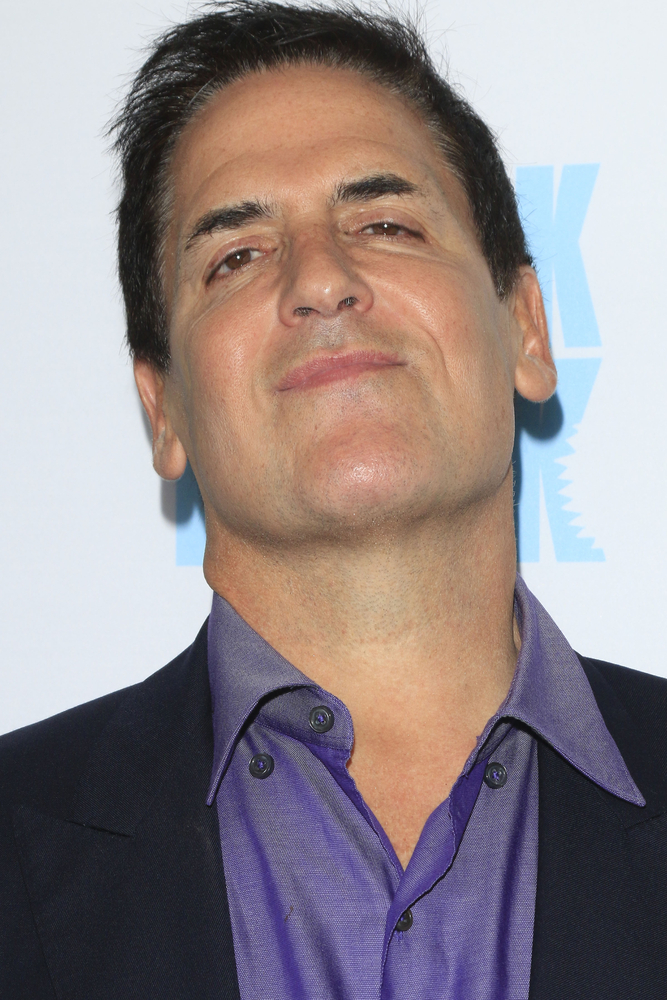 It was Mark Cuban who was credited with famously saying, “Pigs get fed, hogs get slaughtered.” Ironically, his Sharkness and owner of the Dallas Mavericks made his first fortune in radio with Broadcast.com.
It was Mark Cuban who was credited with famously saying, “Pigs get fed, hogs get slaughtered.” Ironically, his Sharkness and owner of the Dallas Mavericks made his first fortune in radio with Broadcast.com.
These days, most program directors are no longer empowered to set limits on the sales department’s ability to place any order they can without running the risk of becoming a “sales unfriendly PD.”
Sadly, the last bastion of protecting stations from the excesses of sales departments running amok has been reduced to cranking music logs and making out the weekend schedule. How else can you explain spot loads that have sprawled out of control while jock endorsements continue to be sold like there’s no limit on how many can be voiced?
Like all good things, there needs to be guard rails and policies in place – not just to stay legal with the FTC, but to also stay credible with audiences and to serve advertisers effectively.
Just take it from me.
- Media And Technology In 2025: Believe It Or Not! - April 18, 2025
- In Radio, You Just Never Know - April 17, 2025
- The Secret To Making A Great Podcast (And Great Radio) - April 16, 2025




What I find odd, and dissonant, about these ads is when there are dueling personal endorsements by hosts at the same station. One station I’m thinking of has opposing endorsement ads for real estate agents: “the only agent I trust” versus “I’d never use anyone else” (I’m paraphrasing). For replacement windows they have three hosts each endorsing a different company and dissing the competitors. I presume this results in diminishing returns to the advertiser.
Wow, that’s just sad. Can you say, “I just shot myself in the foot…again,” Radio?
Steve, listeners with an IQ above 75 pick up on this stuff. And your last sentence is the one that will get us in the end.
How is the “three hosts/three clients”. thing any different than when radio runs political ads? I mean honestly…other than being host read….candidates run them because they work. And the very next spot could be the other guy dissing the first guy (or woman). Stations will accept these as long as clients will pay for them. Let’s not kid ourselves. Why would GMs act any differently than they did with spot loads? (as in NO action). As in…they get fired if the profitability isn’t north of 35-40%, so it’s protect the paycheck first.
Once upon a time, in a galaxy far, far away, there was only one endorsement in a stop-set. Then a live read with ONE pre-recorded at the end of the break. Now, an entire stop-set is wall-to-wall endorsements, sometimes with the same personality doing more than one. Indeed, hogs get slaughtered.
You and I lived in that galaxy. Even in the 80s, things were getting “hoggish.” Little did we know…
Paul Harvey was the one person doing live endorsements audiences could trust. The rest? Not so much.
He was the best, Brad. And even though we knew he didn’t eat Quaker Oats or bathed with Irish Spring, we didn’t care. You had to pay attention to this guy.
“…not going to go all Oxenford on you”….. great line! Great article!
Appreciate that, David. Good to hear from you.
The line forever has been “Pigs get fat, hogs get slaughtered” and Marc Cuban simply misquoted it.
And Marc Cuban has railed on Shark Tank about how dead Radio is.
He really the guy you want to be quoting about radio?
Endorsements are only one zit on the face of radio advertising. I remember when we were mandated -2 stopsets per hour, period. I remember when production departments were slimmed down to the point where one person did spots for up to 4-5 radio stations. I remember at one time when advertisers were treated to a prominent place in the minds of station operators because they paid the bills. Today the 9th spot in a commercial break is worthless, endorsement or not. The liability issue has been around for decades and its mind boggling to think that a large company flush with lawyers would even consider airing spots for a product that couldn’t be tried first. I guess we need to fix all of those problems -one spot at a time. Thanks for the incentive for us to THINK, Fred.
Sounds like you’re been thinking without any prodding from me, Dave.